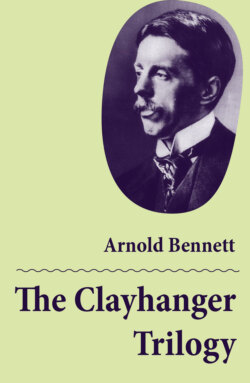Читать книгу The Clayhanger Trilogy (Consisting of Clayhanger + Hilda Lessways + These Twain) - Arnold Bennett - Страница 83
На сайте Литреса книга снята с продажи.
Chapter 15. A Decision.
ОглавлениеTable of Contents
The next day being the day of rest, Mrs Nixon arose from her nook at 5:30 a.m. and woke Edwin. She did this from good-nature, and because she could refuse him nothing, and not under any sort of compulsion. Edwin got up at the first call, though he was in no way remarkable for his triumphs over the pillow. Twenty-five minutes later he was crossing Trafalgar Road and entering the school-yard of the Wesleyan Chapel. And from various quarters of the town, other young men, of ages varying from sixteen to fifty, were converging upon the same point. Black night still reigned above the lamplights that flickered in the wind which precedes the dawn, and the mud was frozen. Not merely had these young men to be afoot and abroad, but they had to be ceremoniously dressed. They could not issue forth in flannels and sweater, with a towel round the neck, as for a morning plunge in the river. The day was Sunday, though Sunday had not dawned, and the plunge was into the river of intellectual life. Moreover, they were bound by conscience to be prompt. To have arrived late, even five minutes late, would have spoilt the whole effect. It had to be six o’clock or nothing.
The Young Men’s Debating Society was a newly formed branch of the multifarous activity of the Wesleyan Methodist Chapel. It met on Sunday because Sunday was the only day that would suit everybody; and at six in the morning for two reasons. The obvious reason was that at any other hour its meetings would clash either with other activities or with the solemnity of Sabbath meals. This obvious reason could not have stood by itself; it was secretly supported by the recondite reason that the preposterous hour of 6 a.m. appealed powerfully to something youthful, perverse, silly, fanatical, and fine in the youths. They discovered the ascetic’s joy in robbing themselves of sleep and in catching chills, and in disturbing households and chapel-keepers. They thought it was a great thing to be discussing intellectual topics at an hour when a town that ignorantly scorned intellectuality was snoring in all its heavy brutishness. And it was a great thing. They considered themselves the salt of the earth, or of that part of the earth. And I have an idea that they were.
Edwin had joined this Society partly because he did not possess the art of refusing, partly because the notion of it appealed spectacularly to the martyr in him, and partly because it gave him an excuse for ceasing to attend the afternoon Sunday school, which he loathed. Without such an excuse he could never have told his father that he meant to give up Sunday school. He could never have dared to do so. His father had what Edwin deemed to be a superstitious and hypocritical regard for the Sunday school. Darius never went near the Sunday school, and assuredly in business and in home life he did not practise the precepts inculcated at the Sunday school, and yet he always spoke of the Sunday school with what was to Edwin a ridiculous reverence. Another of those problems in his father’s character which Edwin gave up in disgust!
